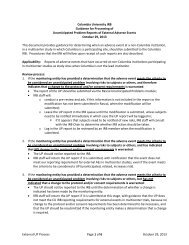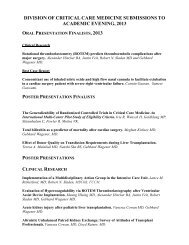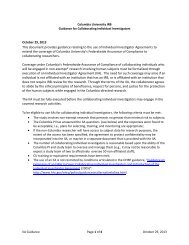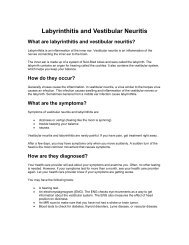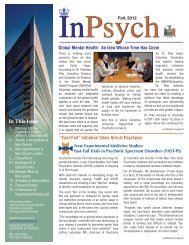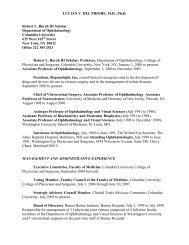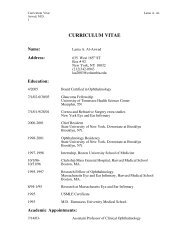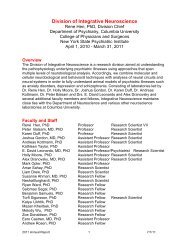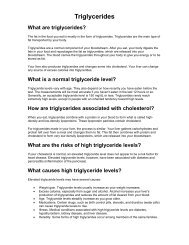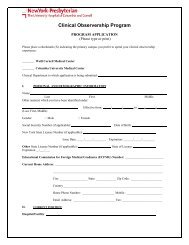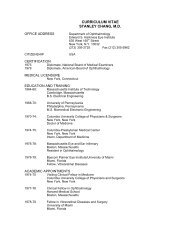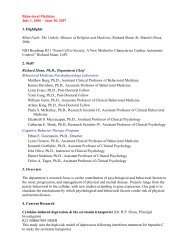Create successful ePaper yourself
Turn your PDF publications into a flip-book with our unique Google optimized e-Paper software.
<strong>The</strong> <strong>Common</strong> <strong>Cold</strong><br />
How can I tell if I have a cold or the flu?<br />
A cold and the flu cause many of the same symptoms. But a cold is generally mild, while the flu<br />
tends to be more severe.<br />
A cold often starts with feeling tired, sneezing, coughing and having a runny nose. You may not<br />
have a fever or you may run a low fever--just 1 or 2 degrees higher than usual. You may also<br />
have muscle aches, a scratchy or sore throat, watery eyes and a headache.<br />
<strong>The</strong> flu starts suddenly and hits hard. You'll probably feel weak and tired, and have a fever, dry<br />
cough, a runny nose, chills, muscle aches, severe headache, eye pain and a sore throat. It<br />
usually takes longer to get over the flu than a cold<br />
What causes colds and the flu?<br />
Viruses. Over 100 different viruses can cause colds. <strong>The</strong>re aren't as many viruses that cause the<br />
flu. That's why there's a shot for the flu and not for colds.<br />
What can I do to feel better?<br />
<strong>The</strong>re's no cure for a cold or the flu. Antibiotics don't work against viruses. All you can do to feel<br />
better is treat your symptoms while your body fights off the virus (see below).<br />
Ways to treat your cold/flu symptoms:<br />
• Stay home and rest, especially while you have a fever.<br />
• Stop smoking and avoid secondhand smoke, which can make cold symptoms worse.<br />
• Drink plenty of fluids like water, fruit juices and clear soups. Fluids help loosen mucus.<br />
Fluids are also important if you have a fever because fever can dry up your body's fluids,<br />
which can lead to dehydration.<br />
• Don't drink alcohol.<br />
• Gargle with warm salt water a few times a day to relieve a sore throat. Throat sprays or<br />
lozenges may also help relieve the pain.<br />
• Use saline (salt water) nose drops to help loosen mucus and moisten the tender skin in<br />
your nose.<br />
• Take acetaminophen 500mg, 2 tablets every 6 hours, and/or ibuprofen 200mg, 2-3<br />
tablets every 6 hours, as needed for fever and pain control.<br />
• Use a humidifier in your bedroom or other rooms you spend lots of time in.<br />
• Use steam inhalations (run hot water in the shower or bathroom)<br />
Should I take medicine for a cold or the flu?<br />
No medicine can cure a cold or the flu. Medicine can, however, help relieve some of your cold or<br />
flu symptoms. Check with your doctor before giving any medicine to children.<br />
Many cold/flu products are available without a prescription. See below for a guide to the common<br />
ingredients in these products.
What's in over-the-counter cold/flu medicines?<br />
<strong>The</strong> ingredients listed below are found in many cold/flu medicines. Read labels carefully. If you<br />
have questions, talk to your doctor or pharmacist.<br />
• Analgesics relieve aches and pains and reduce fever. Examples: acetaminophen,<br />
aspirin, ibuprofen, ketoprofen, naproxen. Warning: Children and teenagers shouldn't be<br />
given aspirin.<br />
• Antitussives tell your brain to stop coughing. Don't take an antitussive if you're coughing<br />
up mucus. Example: dextromethorphan.<br />
• Expectorants help thin mucus so it can be coughed up more easily. Example:<br />
guaifenesin.<br />
• Oral decongestant shrinks the nasal passages and reduce congestion. Examples:<br />
ephedrine, pseudoephedrine.<br />
What about prescription medicines for the flu?<br />
Some prescription medicines can relieve flu symptoms. <strong>The</strong>se medicines may help reduce the<br />
severity of symptoms if they are started soon after you begin to get sick.<br />
Should I call my clinician?<br />
In most cases, you don't need to see your clinician when you have a cold or the flu. However, if<br />
you have any of the symptoms in the box below, call your clinician.<br />
• High (above 102 F) or prolonged fever<br />
• A cold that lasts for more than 10 days<br />
• Trouble breathing or shortness of breath<br />
• Pain or pressure in the chest<br />
• Fainting or feeling like you are about to faint<br />
• Confusion or disorientation<br />
• Severe or persistent vomiting<br />
• Severe pain in your face or forehead<br />
• Hoarseness, sore throat or a cough that won't go away<br />
Copyright © 1996-2005 American Academy of Family Physicians



